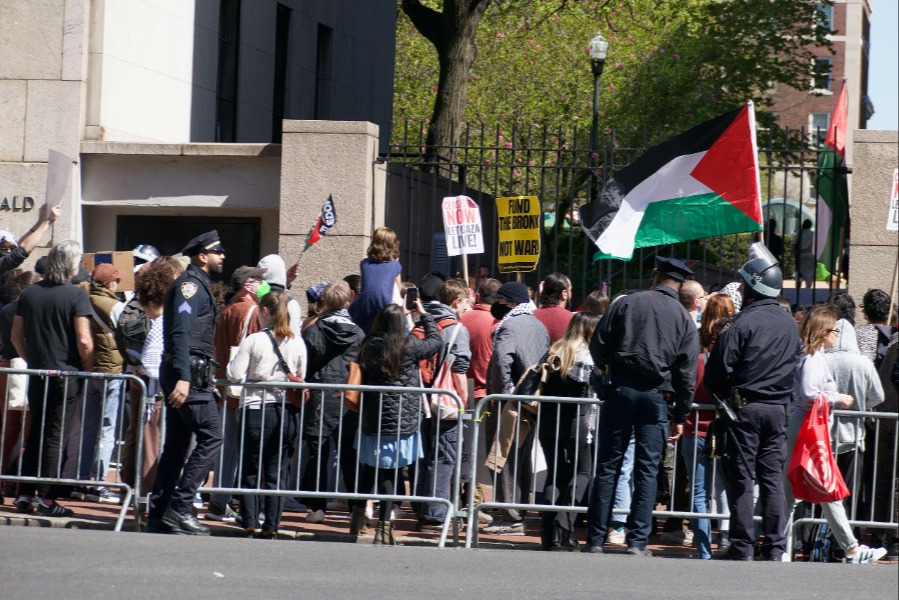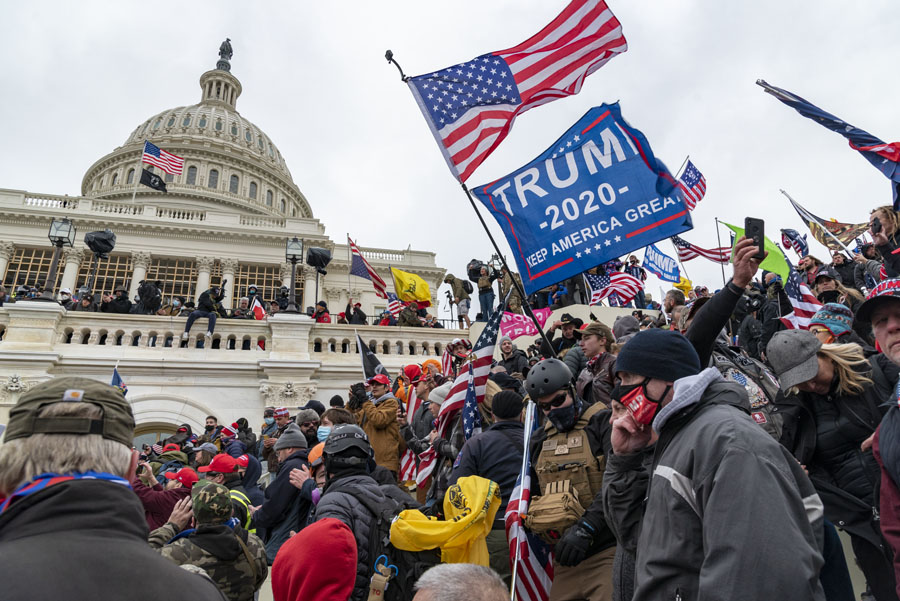Did the President’s Tweets Lead Prosecutors to Seek the Death Penalty for Sayfullo Saipov?
Published by The Lawfare Institute
in Cooperation With

Much has been written, on Lawfare and elsewhere, about the dangers of presidential interference with the Justice Department and, in particular, the special counsel’s investigation. But the broader implications of President Trump’s willingness to interfere with the administration of justice must remain in focus: When the president attempts to direct the course of a particular prosecution or enforcement action, he jeopardizes important constitutional promises of due process and equal treatment. Among others, the courts have a duty to call him out when they see interference and to put a stop to it when they can.
Take, for example, the case of Sayfullo Saipov. (Protect Democracy, where I work, has filed an amicus brief in the Saipov case. Protect Democracy also represents Lawfare contributors and editors Benjamin Wittes, Jack Goldsmith, Scott Anderson and Susan Hennessey on a number of separate matters.) The day after Saipov drove his car onto a Manhattan bikeway in an alleged vehicular terrorist attack in October 2017—the same day that prosecutors filed terrorism charges against Saipov in Manhattan federal court—President Trump, the nation’s chief law enforcement officer, tweeted:
NYC terrorist was happy as he asked to hang ISIS flag in his hospital room. He killed 8 people, badly injured 12. SHOULD GET DEATH PENALTY!
— Donald J. Trump (@realDonaldTrump) November 2, 2017
For several days, he continued to tweet about the case, referring to Saipov as a “Degenerate Animal” and asserting that he would not be “politically correct” in responding to the attack. Now, predictably, Saipov is seeking to bar the government from seeking the death penalty because of the President’s tweets.
Presidential statements about a defendant’s guilt or innocence—much less whether he should receive the death penalty— are highly suspect as a matter of constitutional law. Among other things, the Fifth and 14th Amendments protect defendants against unequal and irregular treatment. When the president tweeted about the Saipov case, he cast a shadow on the Department of Justice’s decision-making and raised serious questions about whether the Department of Justice could make an even-handed decision about whether to seek Saipov’s execution. For that reason, Protect Democracy, where I work, has filed an amicus brief urging the court to investigate whether President Trump’s tweets improperly influenced the government’s decision to seek the death penalty.
The Due Process Clause demands that the government follow fair and neutral procedures before depriving criminal defendants of their liberty or their lives. A central guarantee of this requirement is a disinterested prosecutor. President Trump has recognized this principle where his own interests are concerned: In opposing a civil case brought by the New York attorney general against the Trump Foundation and Trump personally, the president recently argued that “fundamental fairness” requires that “criminal enforcement powers should be wielded in a rigorously disinterested fashion.” Thus, his brief insisted, it’s critical that “those wielding the power of the state” be “independent[:] free from political motivations, political consequences, public opinions, ... fear of favoritism” in order to avoid “discourage[ing] public confidence in our government and the system of law to which it is dedicated.”
The president’s intervention is particularly unwelcome in decisions regarding the death penalty. Recognizing the significance of the decision to seek an execution, the Justice Department has implemented a detailed protocol requiring multiple levels of careful review and final approval by the attorney general. White House intervention appears nowhere in those protocols, nor does the White House have its own protocols to ensure fair administration of the gravest, and most final form of justice. When the president weighs in on specific criminal cases, it is almost impossible for him to be “disinterested.” As then-professor and now-Justice Elena Kagan has written, it is in the area of criminal prosecutions “that the crassest forms of politics ... pose the greatest danger of displacing professionalism and thereby undermining confidence in legal decision-making.” The president’s position as the nation’s most prominent politician makes it all the more likely that politics would intrude—or be perceived to have intruded—on his decisionmaking.
And President Trump gave every reason to believe his tweeting had everything to do with politics and little to do with justice. The same day he called for Saipov’s execution, Trump also tweeted that Saipov entered the United States through the diversity visa lottery program, which he characterized as a “Chuck Schumer beauty” that should be replaced. He also insisted that the government would implement much tougher “Extreme Vetting Procedures”—reiterating a campaign promise.
When the Justice Department announced it would seek a death sentence for Saipov, it brushed away concerns about the president’s influence over that decision. It would be permissible as a matter of law, said the Justice Department, for the attorney general to take the president’s views into account in a charging decision because the attorney general acts as “the hand of the President” in enforcing the law.
This is a startling assertion. Through Republican and Democratic administrations spanning decades, the attorney general has been understood to act independently of the president in making decisions about specific law enforcement matters. The attorney general also has an independent duty to uphold the Constitution, including its guarantee of a disinterested prosecutor. While Trump may wish for an attorney general to follow his politically motivated wishes to investigate his opponents or protect his allies, the Constitution forbids it.
To be sure, President Trump isn’t the first president or senior administration official to comment publicly on a pending criminal case. But even President Nixon—not known for his narrow view of presidential prerogatives—realized that he should not comment publicly on a defendant’s guilt or innocence. After accidentally asserting during Charles Manson’s trial that Manson “was guilty,” the president issued a retraction shortly thereafter that “the last thing I would do is prejudice the legal rights of any person, in any circumstances ... . All of the facts in the case have not yet been presented. The defendants should be presumed to be innocent at this stage of their trial.”
President Obama made, and retracted, a similar mistake in the capital punishment context. In 2009, defending his administration’s decision to try 9/11 mastermind Khalid Sheikh Mohammed in civilian court, Obama suggested that Mohammed would get the death penalty: “I don't think [the civilian trial] will be offensive at all when he's convicted and when the death penalty is applied to him.” But Obama—unlike Trump—quickly clarified that he wasn’t prejudging the outcome, explaining “that’s the job of prosecutors, the judge, and the jury.”
In 1995, Attorney General Janet Reno came under fire for saying, on the day of the Oklahoma City bombing, that “[t]he death penalty is available, and we will seek it.” President Clinton confirmed that he “certainly believe[d] that [the defendants] should be executed.” As Saipov’s lawyers have done, lawyers for Timothy McVeigh and Terry Nichols asked the court to prevent the prosecution from seeking the death penalty because of Reno’s comments.
In that case, the district court rejected the defendants’ argument that Reno and Clinton’s statements gave rise to a constitutional violation because there was no evidence showing that the charging decision was improperly motivated. But in cases like this, defendants are unlikely to make such a showing without some kind of court-ordered discovery, since the government typically has sole possession of the evidence of how it reached its prosecutorial decision. And in the Nichols and McVeigh case, the court never gave the defendants an opportunity to obtain relevant evidence.
For that reason, the court hearing Saipov’s criminal case should either order the government (1) to demonstrate that its death penalty charging decision was untainted by politics or (2) to allow the defendant to conduct limited discovery into that question. Freedom from political interference in specific law enforcement matters is paramount to our democracy. Courts have a duty, and the power, to ensure that the government fulfills its obligation to do equal and impartial justice based on facts and law—even when the highest levels of the government have urged otherwise.



.jpeg?sfvrsn=6117c6bf_4)

